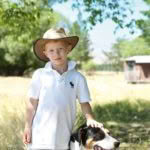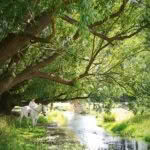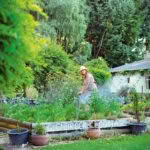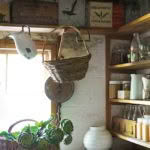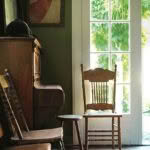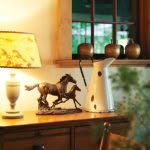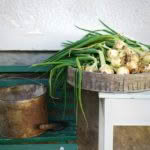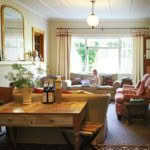The North Otago high country station selling merino to NATO
- George with Sam. The tri-coloured heading dog is from a long line of Simon’s dog-trial dogs.
- Zephyr, quite a famous competitive pony in his day, resting on his ribbons and enjoying his retirement at Glenbrook. The boys always have a lot of pets in tow: lambs, ducks, guinea pigs, chooks, pups.
- Kirsty harvesting salad for dinner. The property produces a huge range of crops but asparagus and broad beans are among the most rewarding because they are the most difficult to grow in the climate.
- The gingham curtains around the stainless steel bench in the kitchen were made with the help of a girlfriend, Ali. Simon still jokes, when visitors ask where to find something, that it’s “behind the skirt”.
- The piano came with the house. “We’re not a musical team,” says Kirsty, “Luckily friends come who can play.”
- The lamp, with birds on it, was bought by Kirsty with bird-obsessed Ted in mind. But it was Simon who fell in love with – and purchased – the bronze horses.
- The enamel chook bucket on the kitchen bench was found in a junk shop in Timaru by a delighted Kirsty, “it’s even got a lid”. The knife block, complete with barbed wire, was made from an old fence post.
Writer: Lisa Scott Photos: Rachael Hale McKenna
Originally published in NZ Life & Leisure, Sept/Oct 2016
Welcome to Glenbrook Station, the rowdy home of Simon and Kirsty Williamson and their three rambunctious boys – Ted (8), George (6) and Ben (5). Keep your hands in the vehicle at all times.
The best place to observe these boisterous creatures is in their natural habitat, circling the kitchen’s ancient kauri table. The base of operations for daily life, it’s been beaten to butter by the clattered cups and plonked-down plates of thousands of meals – it hosts two dinner sittings every night through summer as workers “go till there’s dew on the wheels” harvesting small seeds.
Pull up a mismatched chair and chances are a small boy will shortly be whispering a secret in your ear; another will carefully proffer his woollen hat holding four chicken-warm brown eggs. Don’t get too comfortable though as nobody here has the time, or the inclination, to sit still.
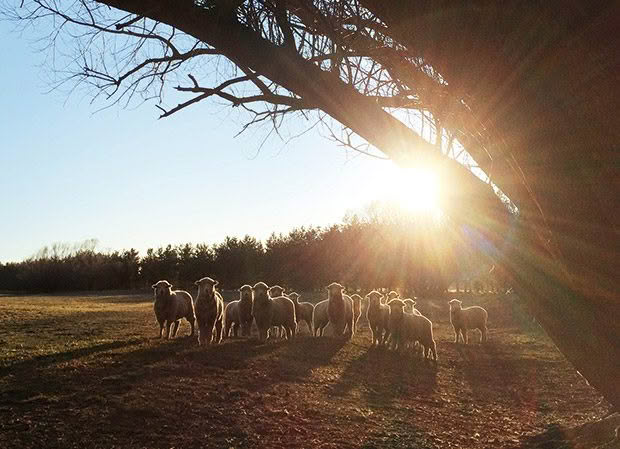
In 1855 the first station owners shore 100,000 sheep, the next season there were just 50,000 left, the rest buried in snow.
Glenbrook Station, 3700 hectares near Omarama on State Highway 8 in North Otago, was actually created for another kind of boy. The sad boys who returned from World War One were the reason the original Benmore Station, once stretching all the way from the Ahuriri River in the south to the Ohau River in the north, was split for ballot.
The Williamsons have owned Glenbrook for 12 years, having previously farmed in the harshest of conditions at high country Birchwood Station in the Ahuriri Valley inland from Omarama for three generations before selling it to the crown in 2003 as conservation area.
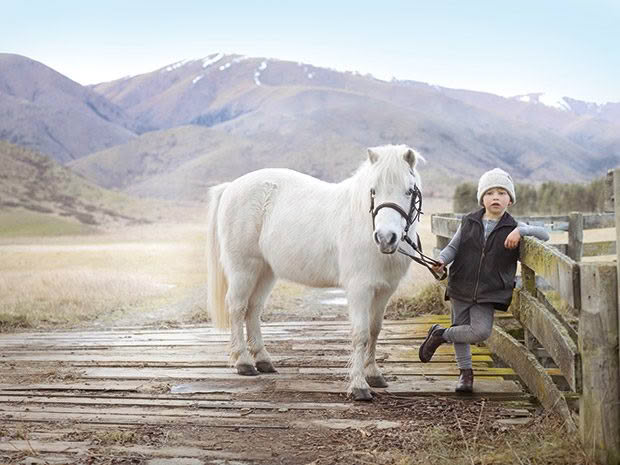
Ben photographed for a Norwegian clothing company. The hooked leg is his modelling pose; he’s all over social media.
Glenbrook runs merino ewes, lambs, beef calves and a host of pets as well as two redheads and a brunette. The brunette came first, meaning Simon won a bottle of whiskey with son Ted’s arrival, having, in a hasty move for the ginger-hued, bet against his own children being redheads. “I stopped betting at that point,” he says.
Perhaps it’s this pragmatism that sees him wear so many hats. He’s chair of the board of Twizel’s newly opened medical centre after overseeing a two-year drive to raise the $1.8 million needed to build it. Simon’s also Federated Farmers’ provincial president and, like his father Ron before, president of the Kurow Jockey Club, whose annual race meeting is a big day out for the entire Waitaki Valley.
Three years ago Simon and Kirsty, together with a fellow Kiwi, started State Highway 8 Merino, selling their wool direct to the United States, supplying and sourcing wool for sock manufacturer Point6 (thanks to the personal relationship developed, they’re now the New Zealand distributor) and working closely with Global Merino, based in San Francisco.
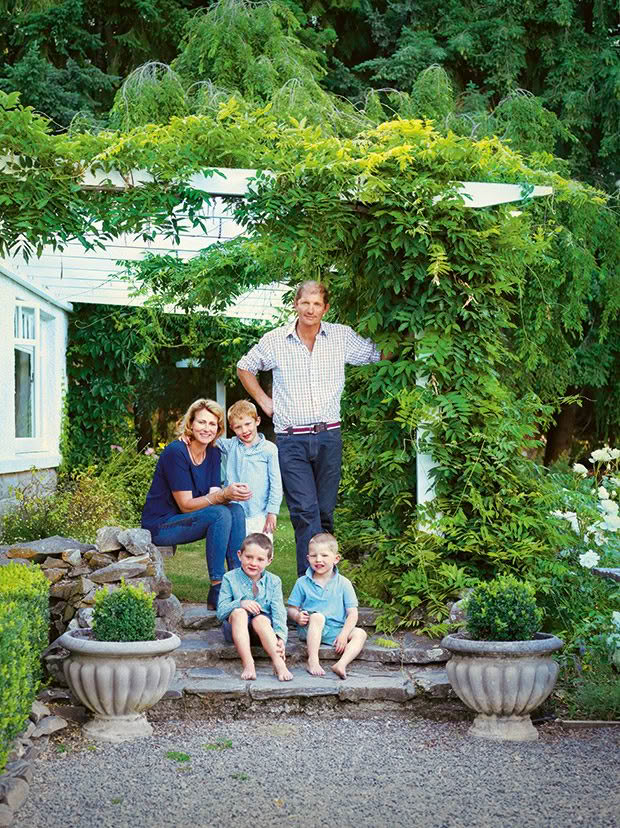
George (next to his dad Simon) is the best potato harvester and would like to be Richie McCaw. Ted (sitting directly in front of Kirsty) is a fan of all things feathered. Ben (to Ted’s left) likes to distinguish himself as “Ben, the person”, just in case someone mistakes him for Ben, the dog. His hair is a tragic accident. Simon went to mow hay and Ben was shorn by Ted (who has previous form for cutting things, such as pony’s tails). Luckily there were no scalp wounds but a skinny hairless boy haunted the house for months.
“Customers love the wool story, they want to know from the ground up how the sheep’s been treated. And for the wool grower, it’s a wonderful extension to be in touch with the end user,” says Simon. With 100 per cent New Zealand merino wool now going into hunting clothes, school uniforms and socks for NATO, he says it is
very satisfying.
While they’d known each other for a long time, it was a catch-up at the Riccarton Races that sent Simon flying his plane to North Canterbury and to Kirsty’s (nee Rutherford) family home, Montrose. He’d collect her and her dogs, bringing them back to his Omarama home for regular visits. Then, “one day I just didn’t go back”, she says.
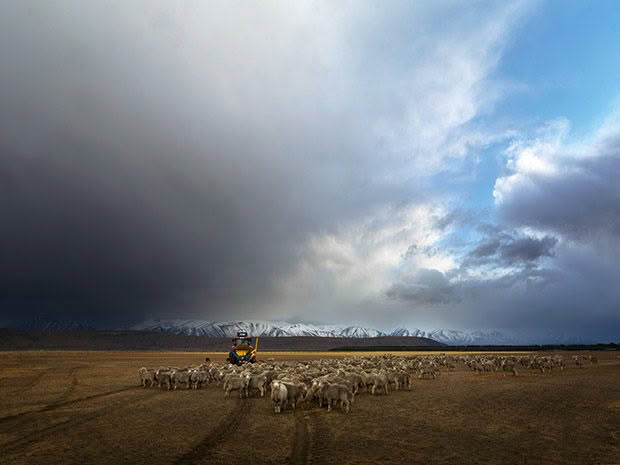
Feeding out under a harsh sky, Ben Ohau range in the background. Farming here has never been easy.
Thus imported, she later found herself acclimatizing to baking summers, hoar frost winters and three boys under two and a half – which entailed facing new challenges such as having to put a lock on the kitchen door to be able to breast feed the baby without the toddler escaping. Small wonder everything in this part of the country seems “more extreme in every way”.
Swapping horse breeding on the plains for wild-thing wrangling in the mountains, Kirsty runs the house and feeds the workers – damning herself with the faintest praise as just someone who loves to cook even though she was once a travelling chef. She spent three winter ski seasons cooking in France’s magical and vast Courchevel, and the summers cooking around Europe. Now she’s ringmaster to a turbo-boosted circus.
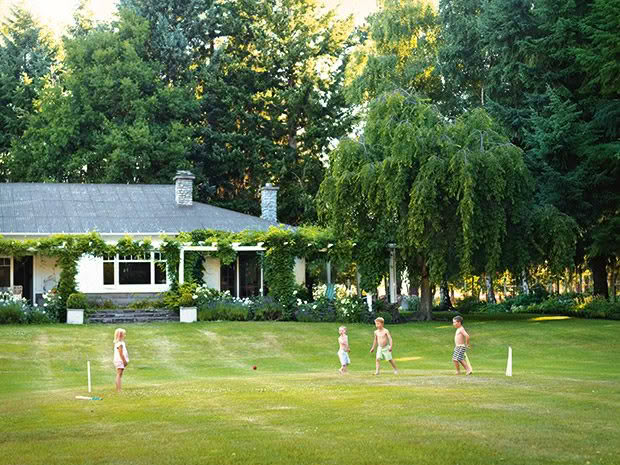
Cricket on the lawn under the flowering cherry tree is often played sans clothing. This day, however, the boys don shorts out of respect for their friend, Charlize McKenna.
The tribe of three youngsters, whose latest enthusiasm is pulling out wiggly teeth using dental floss and a doorknob (with help from their father) may appear well dressed but prefer running naked. And that state of undress persists while shooting tethered balloons with a slug gun, riding ponies, climbing trees, sneaking puppies into bedrooms… it’s like something from a Boys Own annual from a bygone age.
They do skid to a halt when their mother asks them to do something but, should she turn her back for a minute, anything could happen… like a tragic haircutting incident such as the one that occurred when Ted swiped a great big pair of kitchen scissors and cut off Ben’s locks. It took months to grow back a respectable head of hair.
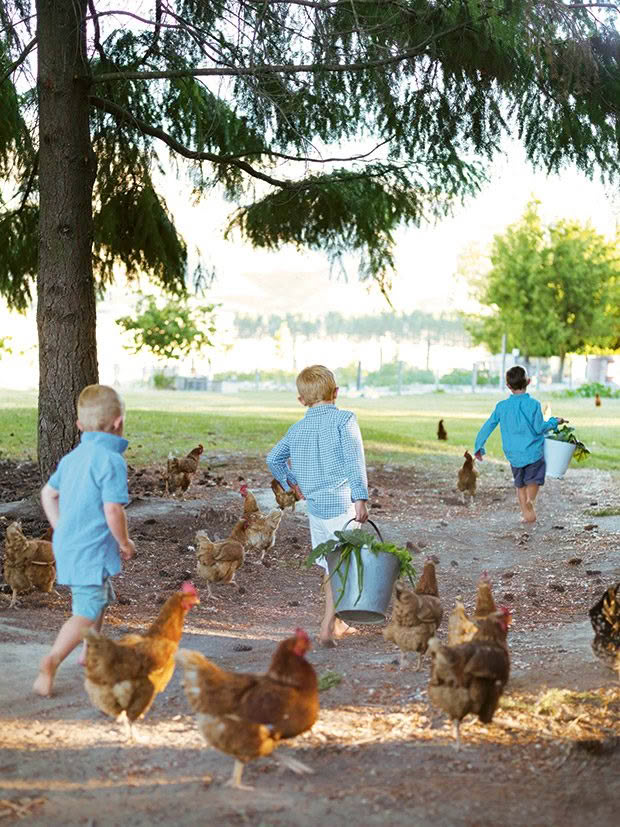
The chooks are red shavers.
“I had great intentions,” says Kirsty, of the mess left behind by the tribe and (six) friends staying during school holidays. Babysitters are thin on the ground at this altitude and it might be presumed the constant noise and need to defuse small-boy energy before it blows the roof off would wear her to a frazzle. Not a bit of it.
Everything else in this century-old house is fabulously distressed. Rugs stepped on every day for decades are marvellously frayed; armchairs are out at the elbows; christening silver has been polished by generations of hands; wooden sideboards are scraped, clunked and bumped. It’s all the real deal, complete with time’s lines and wrinkles, and is testament to the lives and loves of a long line of landowners.
The unflappable Kirsty’s personal taste is Old World, a cure for modernity’s plastic lack of permanence. She’s been a fantastic fossicker, a religious re-purposer, scouring the junk shops of the South Island during a mad phase of unbridled collecting.
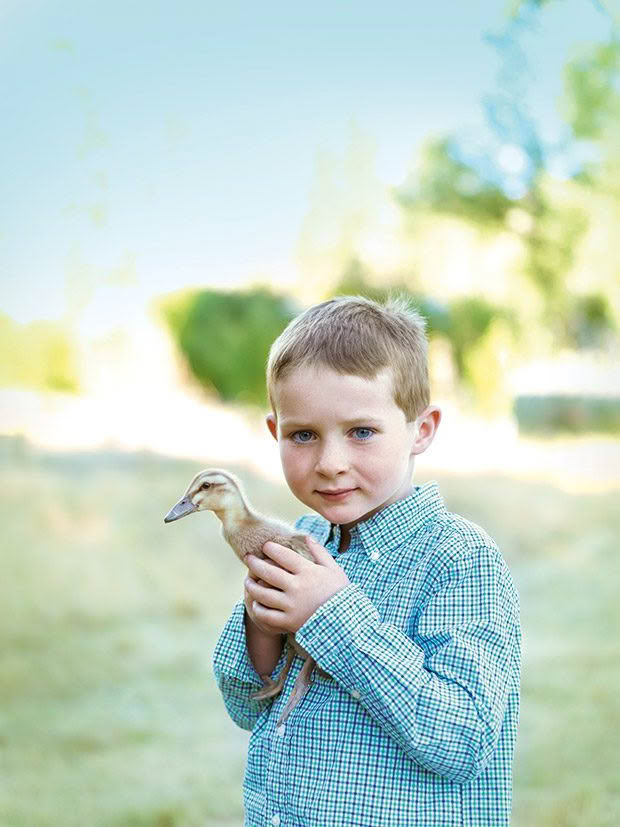
Bird-lover Ted gets a feathered “fix”.
This was fortuitous, she says, because now she can’t get out, and anyway, the house is full to overflowing. Five-dollar finds lean against family heirlooms, and everywhere kilims from her travels in Turkey warm the wooden floorboards.
Trotting along the hallway are old prints of jockeys, mantels are mounted with antique crops, spurs and riding helmets rubbed soft. If it has a handle it’s leaning against the fireplace – golf clubs, tennis rackets, pool cues….
Outside, 450 metres above sea level, the wind in the trees feels alpine. An old telephone pole is nearly swamped with ivy, wisteria pods dangle soft velvet pendants over the open veranda and antlers make thorny garden ornaments. A horse whinnies, gumboots crunch on gravel, a rugby ball thwacks into a hedge. The house thrums with energy; the windows seem to bulge with a soft lemon light. It’s boy power.
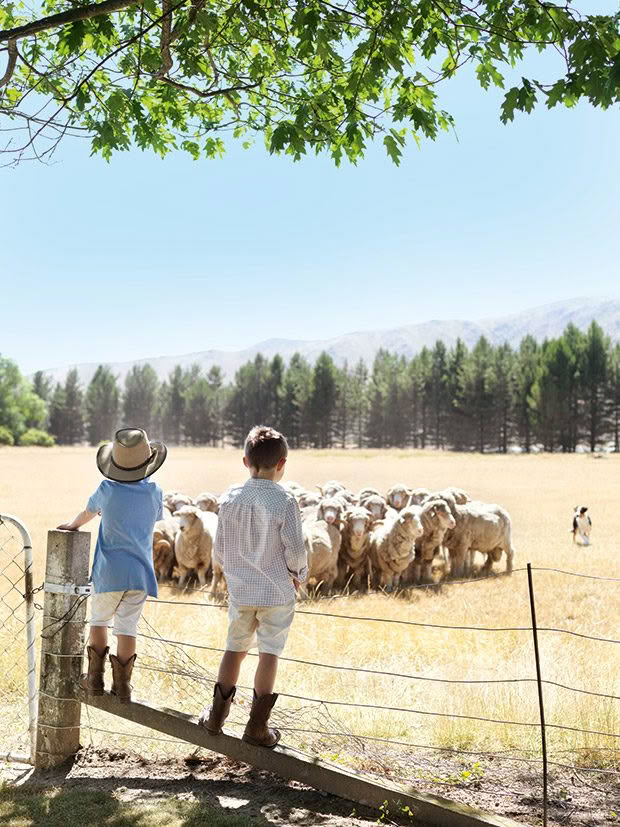
Ben and Ted survey the merino rams with a dog called Sam.
The old entrance proper opens into the formal dining room, which they don’t use much “because our children are so wild”. Everything in here is fashioned to fit a family of big friendly giants, including an old Morris chair with enormous oak arms, a pair of massive pews and a billiard table that doubles as dining bench.
Many of the paintings are landscapes of Birchwood and images of high country life by Simon’s artist friends – Rob McDowell, Andris Apes, Kate Calder, Burns Pollock and Paul Deans among them.
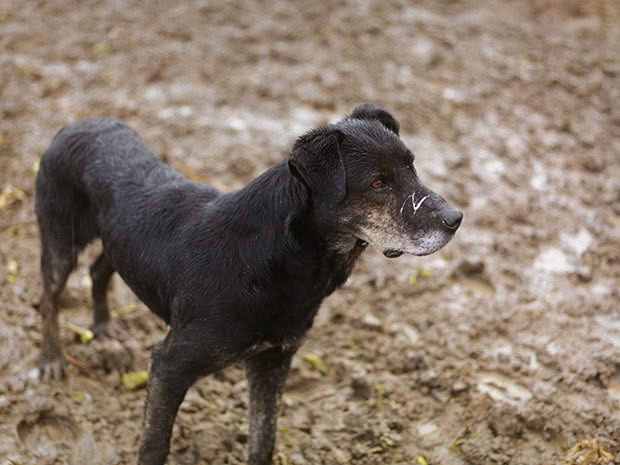
Fantails fly in and out during the summer, while boys flit back and forth playing cricket on the sloping lawn out front all day long − sometimes clothed. “With no broken windows. Yet.”
And here we’ll leave the Williamsons, with socks needing posting, animals to feed, and meat needing to be put in the oven. But three wild boys are happy, and asleep. Shhhh. Back out of the room quietly.
SOCK IT TO ME
It all began with cold, wet feet. American couple Peter and Patty Duke, long-time ski instructors and wool entrepreneurs, started Point6 Socks after Peter bought synthetic socks (worst mistake of his life) and became enraged by having to pour water out of his ski boots, his feet the coldest they’d ever been. Warm and dry in merino socks, the light bulb went on during a skiing holiday in New Zealand.
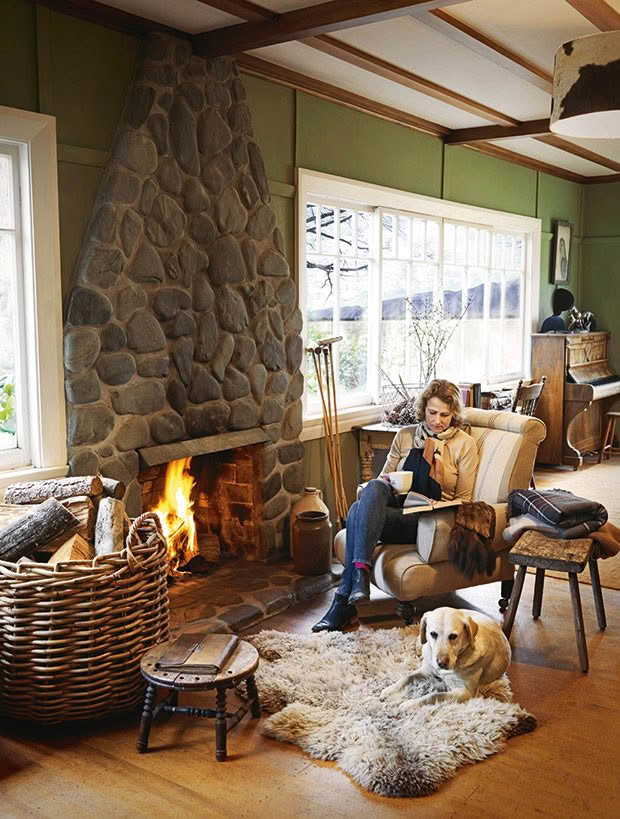
Ella the “duck dog” looks a bit wary, having been spotted by the fire. “She knows Simon’s seen her, and she’s really an outside friend,” says Kirsty.
Smartwool was launched in 1994 and after experiencing frustration in Australia, the Dukes came to New Zealand to source wool, meeting Simon Williamson at a trade fair five years ago. Focussing initially on socks, Point6 was born, named after the need to keep body temperature at an optimal 98.6 degrees Fahrenheit. Now selling approximately 600,000 pairs a year, the business specializes in socks for outdoors, skiing and an adventurous life as well as just keeping your tootsies toasty.
The brand is known for quality, for returning the wool farmer a fair margin, for being sustainable and for ensuring the Point6 sheep have happy lives. Point6 socks are available in New Zealand at PGG Wrightson.
HORSEY BUSINESS
There’s a reason Kirsty’s sewing talents are limited to pony manes – this is a very horsey house. Both Simon and Kirsty’s parents rode and raced horses. Simon’s dad Ron, known far and wide, raced a horse called Birchwood Run and Kirsty’s parents had a lot of fun with King Montrose.
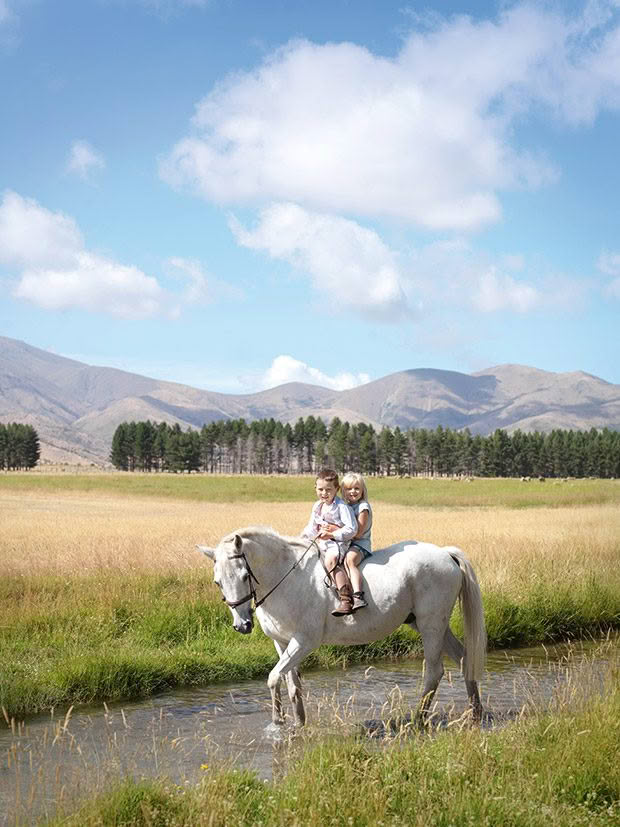
Cooling Zephyr the pony’s heels in the Wairepo stream, on the horizon the borders of Benmore, Buscot and Ben Omar stations, which were all (with Glenbrook) once part of old Benmore Station’s 133,500-odd hectares.
Before the boys came along, Simon and Kirsty spent most of their days on horseback, she in three-day eventing and show jumping, moving cattle and mustering, both of them breaking in and breeding horses. But she’s lucky if she gets to ride the neighbours’ horse these days. Now it is time to give the boys a chance, especially if they go to boarding school. “They don’t see us riding, which is a bit sad, but I want them to at least know the back from the front and Ted, especially, is keen as mustard.”
They made the trek north recently for their first-ever show, the Amuri A&P in Rotherham. “My parents had eight out of their 10 grandchildren riding together that day, (ages 4–10). It was very special and well worth the effort of three boys and two ponies traveling seven hours.”
Love this story? Subscribe now!
 This article first appeared in NZ Life & Leisure Magazine.
This article first appeared in NZ Life & Leisure Magazine.
